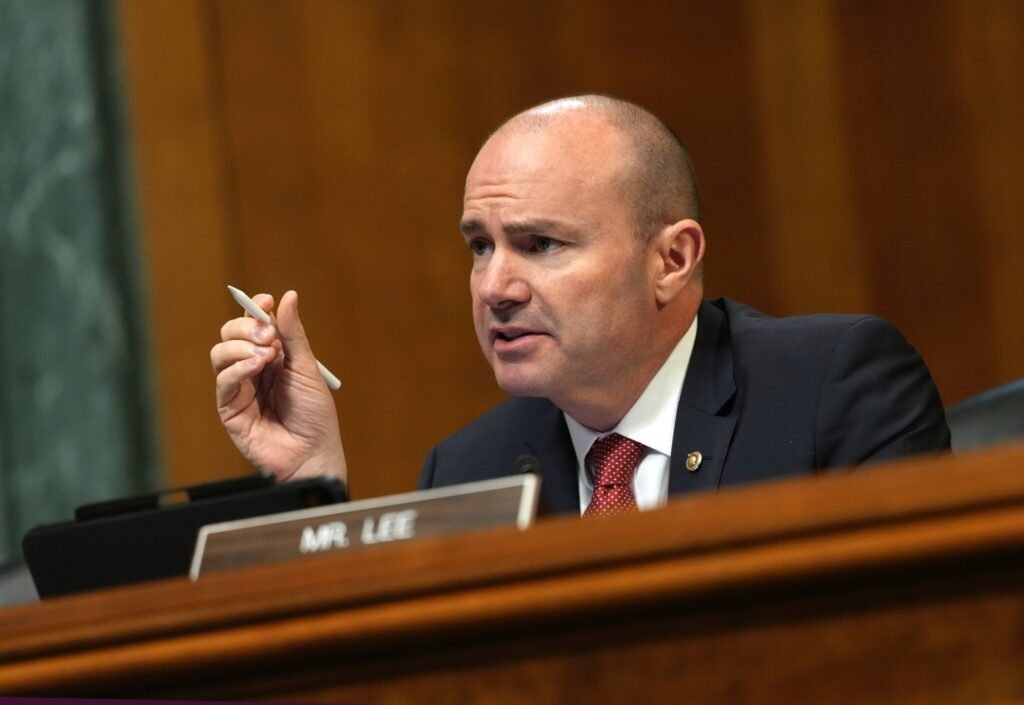U.S. Sen. Mike Lee, R-Utah, participates in a Senate Judiciary Committee hearing at the Dirksen Senate Office Building on May 13, 2025 in Washington, D.C. (Photo by Kevin Dietsch/Getty Images)
U.S. Sen. Mike Lee says he will revamp his controversial proposal to require the sales of vast acres of federal lands in the West so it can be included in Senate Republicans’ sweeping tax and spending cut package.
Lee will be seeking approval for his revised plan from the Senate parliamentarian, who will decide if the provision complies with the chamber’s strict rules for the fast-track procedure Republicans are using to pass their bill. An earlier version of Lee’s plan was dropped from the measure.
Lee, a Utah Republican who chairs the Senate Energy and Natural Resources Committee, wrote on X on Monday night that he would alter the proposal to include only Bureau of Land Management land within 5 miles of a population center and exempt U.S. Forest Service lands altogether.
The amended version would also create “freedom zones” and protect “our farmers, ranchers, and recreational users,” Lee said.
It was not immediately clear what either point would mean and legislative text of the proposal was not publicly available Tuesday. A spokesperson for the committee Lee leads did not return a message seeking comment Tuesday morning.
The original version of the proposal would have mandated the sale of at least 2 million acres of BLM and Forest Service land in 11 Western states. The Senate parliamentarian ruled that language did not comply with the Senate’s rules for budget reconciliation, according to Senate Budget Committee ranking Democrat Jeff Merkley of Oregon.
Budget reconciliation is the procedure Republicans are using to pass the package that contains most of President Donald Trump’s domestic policy priorities, including extension of the 2017 tax cuts.
The process allows passage with only a simple majority in the Senate instead of the usual 60 votes but comes with strict rules that every provision has a substantial impact on the federal deficit and relates to spending and taxes.
Polarizing provision
Lee’s social media post emphasized his goal was to expand housing supply by making public lands available for new construction.
“Housing prices are crushing families and keeping young Americans from living where they grew up,” Lee wrote. “We need to change that.”
Democrats and some Republicans from the affected states — Alaska, Arizona, California, Colorado, Idaho, Nevada, New Mexico, Oregon, Utah, Washington and Wyoming — strongly opposed the measure, seeing it as a one-time sell-off of public lands used by hunters, hikers, ranchers and other users of public lands.
The provision “would have gutted America’s public lands and auctioned them off to the highest bidder, in yet another bid to benefit the wealthy,” Senate Democratic Leader Chuck Schumer said Tuesday.
“Republicans tried to rip away hundreds of millions of acres of public land—not to help families, not to solve real problems—but to hand yet another gift to the wealthy and well-connected,” he added. “It was outrageous, it was shameless, and it would have forever changed the character of the country. Senate Democrats fought tooth and nail to keep public lands in public hands because these lands belong to everyone—not just the privileged few.”
A similar provision was removed from the House’s version of the reconciliation bill in the face of heated opposition from Western Republicans led by Montana U.S. Rep. Ryan Zinke.
The former Interior secretary said last week he remained firmly opposed to the Senate version of the bill that included Lee’s proposal.
“I have said from day one I would not support a bill that sells public lands,” he wrote on X. “I am still a no on the senate reconciliation bill that sells public lands. We did our job in the House. Let’s get it finished.”
Other energy provisions stripped
Merkley reported the Senate parliamentarian also ruled several other provisions of the Energy Committee’s section of the package to be out of compliance with the “Byrd Rule,” which governs what can be included in a reconciliation bill.
Among the provisions the parliamentarian removed were items that would have waived environmental review requirements for offshore oil and gas development, mandated approval of a controversial mining road in Alaska, required annual lease sales for geothermal energy lease sales while changing how geothermal royalties are calculated and allowed natural gas exporters to pay a fee to have projects exempted from environmental requirements.
Other provisions in the committee’s reconciliation instructions were still under review Tuesday, Merkley said.
In a statement, Merkley said he would continue to lead Democrats’ campaign to strip provisions from the GOP bill.
“Democrats will not stand idly by while Republicans attempt to circumvent the rules of reconciliation in order to sell off public lands to fund tax breaks for billionaires,” he said. “We will make sure the Byrd Rule is followed and review any changes Republicans attempt to make to the bill.”






